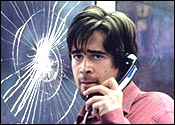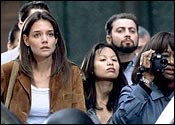Home > Movies > Reviews
Phone Booth dials a wrong number
Arthur J Pais |
April 07, 2003 13:15 IST
The new Colin Farrell (Minority Report) movie Phone Booth is gripping in parts and certainly a better film than recent duds like The Core and Dreamcatcher. 
It is about 80 minutes long but as it ends one may wonder how much of it made sense. Why does a lone sniper go to great lengths to threaten a publicist (Farrell) and make him confess to various misdeeds? Was this man such a monster that the sniper had to follow him, study his habits and wait till he got into a phone booth before starting to threaten his life?
Halfway through the movie, we are convinced that director Joel Schumacher has dialled a wrong number.
The movie, which premiered at the Toronto International Film Festival last September, was to be released last fall, but was put on the backburner when real-life snipers in the Washington DC area began hogging the headlines.
Farrell plays Stu Shepherd, a married New York publicist lusting after a struggling new client. He has no qualms taking advantage of people under him and doesn't think twice about throwing his weight around.
The sniper -- we hear only the voice of Kiefer Sutherland -- has decided to get rid of the morally bankrupt Shepherd. When Stu picks up the phone he finds the sniper knows his name, his routine, his would-be girlfriend's name and phone number -- and worse, his wife's name and number.
New Yorkers know too well they should not answer a public telephone, but our deeply flawed hero who seems to think he is streetsmart, forgets he is a New Yorker and picks up the phone.
This is one of the many illogical steps in the film.
Yet, at least for the first half an hour, we become willing victims of the manipulation by the scriptwriter and director, even admire Farrell who is becoming increasingly melodramatic in the film.
But as the film becomes more concerned with its condemnation and confession aspects, it begins losing audience interest. In the end, it seems far longer than its 80 minutes.
Stu's dilemma becomes even more acute when a police captain (Forest Whitaker) arrives and tries to negotiate his release. Stu has to lie continually as to what he was doing in the phone booth -- and about his relationship with the new client he has been trying to seduce. He has to invent lies to cover his daily phone calls to the new client from the same phone booth.
The movie, written by Larry Cohen, is supposed to be a tribute to Alfred Hitchcock who turned ordinary places into nightmares. Remember the menacing and mortal danger in the shower in Psycho?
Cohen reportedly sought to get Hitchcock make a film out of his script some three decades ago. Hitchcock, who had his own share of undistinguished films such as Torn Curtain, declined the offer.
He certainly did not want to make a wrong call.